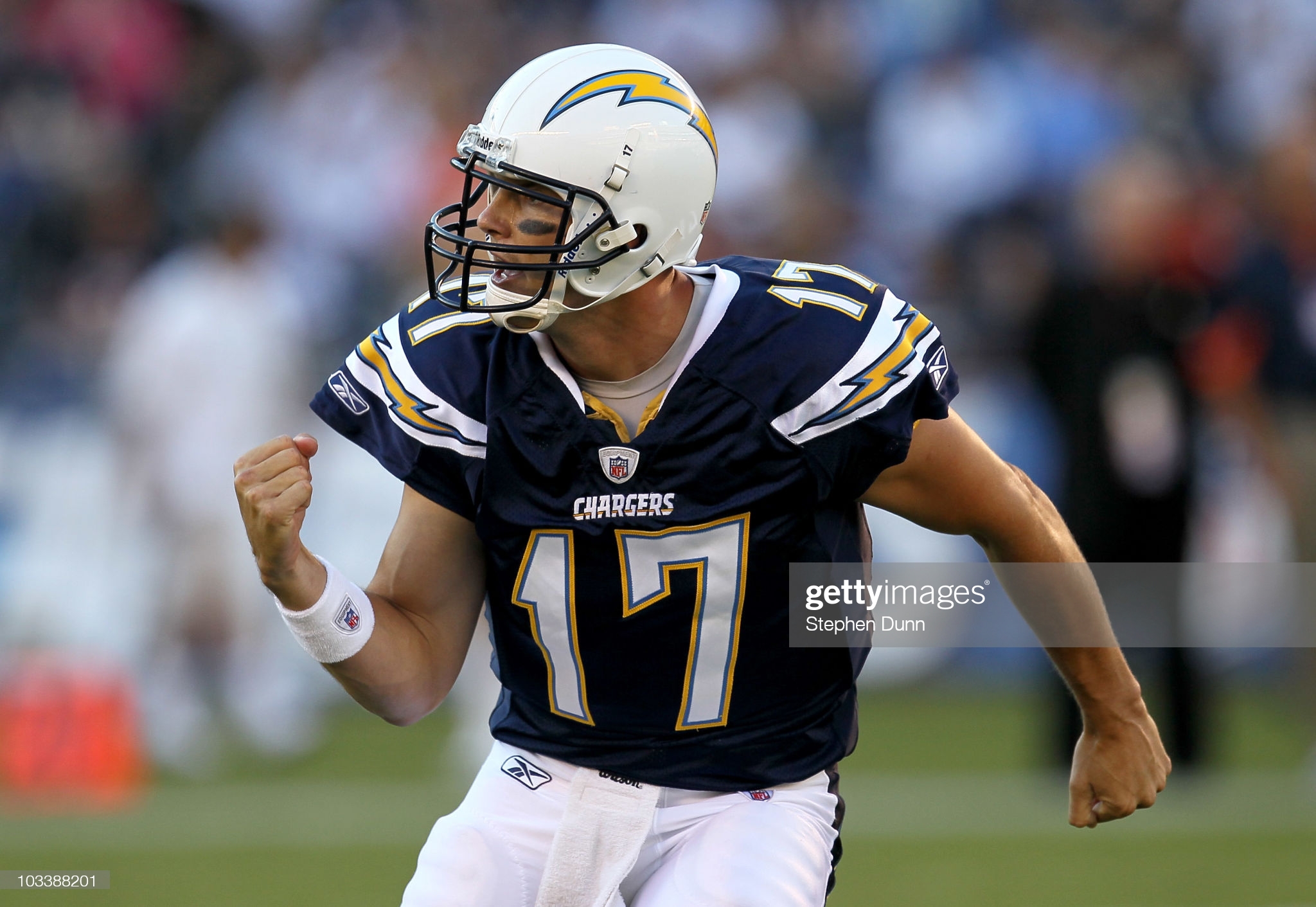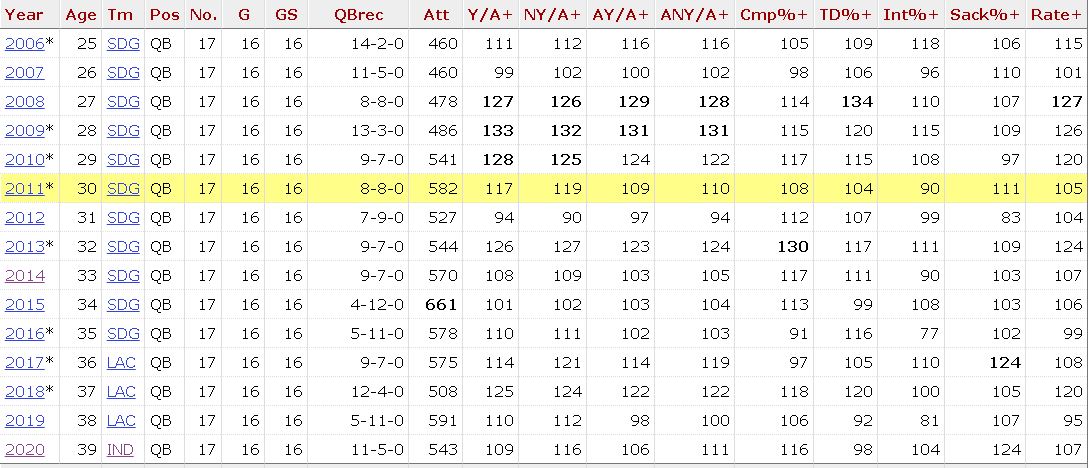
I’ve long since been a fan of Philip Rivers. For 15 seasons, he epitomized a lot of the qualities you’d like in a quarterback – size, pinpoint accuracy, trash talking skills, and unbelievable durability. His flaws were obvious as well; by the end of his career, he was removed from the game in obvious Jacoby Brissett running situations, he couldn’t throw deep very well, and he’s statuesque in the pocket.
With Rivers officially retiring, I thought I would take a good honest look at his Hall of Fame credentials. Do impressive regular season statistics make up for the glaring lack of hardware? Let’s take a glimpse at his accomplishments:
Philip Rivers in the Regular Season
Over 15 years as a starter, Rivers started all 240 regular season games (224 for the San Diego/Los Angeles Chargers and 16 for the Indianapolis Colts). He’s fifth all-time in both passing yards (63,440) and passing touchdowns (421). He threw for 4,000 yards in 12 different seasons, topped 20 TD passes in each of his last 15 seasons, and finished with a higher career YPA average (7.80) than Aaron Rodgers (7.78), Peyton Manning (7.67), Drew Brees (7.62), or Tom Brady (7.47).
In fact, it’s the yards per attempt stat that was one of Rivers’ most impressive stats, especially considering with the unique and unorthodox way in which he threw the football by essentially shotputting it down the field.
For three straight years in the heart of the Manning/Brees/Brady era (2008-2010), Rivers led the NFL in YPA.
2008: 8.39 YPA (23rd best ever by a 16-game starter)
2009: 8.75 YPA (9th best ever by a 16-game starter)
2010: 8.71 YPA (12th best ever by a 16-game starter)
He won the Comeback Player of the Year award in 2013, highlighted by an 8.23 YPA. And he came back in 2018 with another stellar YPA campaign (8.48). He’s the only QB in history with five seasons of 16 starts and a YPA over 8.00; in fact, only Peyton Manning and Steve Young have even done so three times.
Rivers led the league in his fair share of statistics, at one point or another leading the league in each of the following categories: completions, completion percentage, passing yards, TD passes, passer rating, ANY/A, and sack percentage.
And his ability to always suit up for his team was remarkable. He will end his career with 240 consecutive games started at quarterback – this despite throwing over 8,000 passes and absorbing 464 sacks. Throw in the postseason, and that streak extends to 252. He’s tied for the third-longest regular season streak of consecutive games started and he’s fourth if you include the playoffs.
By virtue of his eight Pro Bowl selections, Rivers was consistently recognized as one of the best in the league. He never won an MVP or really threatened for one, but was a top 5-7 quarterback for the bulk of his career.
Philip Rivers by Advanced Statistics
Thanks to our dear friends at Pro Football Reference, there are actually advanced statistics for quarterbacks – the NFL’s version of sabermetrics. A league-average placement in a particular statistic gets a 100 (similar to baseball’s ERA+). A 110 is 10 percent above average, a 120 is 20 percent above average.
If you look at ANY/A index (the most important statistic considering it factors in TDs, INTs, and sacks), Rivers has been above-average every season of his career. His career ANY/A index is 112, which would place him seventh of the 14 Hall of Fame quarterbacks. Here are his other advanced statistics along with his ranks when compared to the Hall of Fame quarterbacks:
Completion percentage: 110 (T-11th)
YPA: 114 (4th)
TD percentage: 110 (10th)
INT percentage: 101 (10th)
Passer rating: 110 (9th)
Sacks: 107 (6th)
You can see Rivers fits comfortably among the all-time quarterbacks by both standard numbers and advanced numbers.
Philip Rivers in the Postseason
The postseason argument doesn’t help Rivers’ case. Quarterbacks are judged by their Super Bowl victories, and Rivers has none. He’s never been to a Super Bowl. He joins Dan Marino as all-time greats with no rings and he’s in a class with Dan Fouts and Warren Moon as the best modern-day quarterback to never reach a Super Bowl.
Rivers was a disappointing 5-7 (.417) in the postseason over his career. He won a playoff game in four different seasons and reached the AFC Championship Game just once – famously playing through a torn ACL in 2007. Three separate times Rivers saw his Super Bowl aspirations end at the hands of Bill Belichick/Tom Brady, although he can say he was 2-0 against Peyton Manning.
Rivers’ career playoff numbers aren’t in the Andy Dalton class of shame. They’re merely subpar.
Among quarterbacks with at least 10 career playoff starts, only Fran Tarkenton had a greater decline (5.9%) in completion percentage from the regular season to the postseason than Rivers’ 5.4%. Just six quarterbacks had a larger decline in passer rating than Rivers’ 11.0 decline.
Rivers also found himself on the wrong side of bad luck far too often. After Marlon McCree’s famous fumble in the 2006 AFC Divisional Playoffs, Nate Kaeding missed a potential game-tying 54-yard field goal (a long kick, but a makeable one) in the final seconds of Rivers’ first-ever playoff game. Kaeding returned to miss all three field goals in a 2009 AFC Wild Card 17-14 loss to the New York Jets.
It wasn’t a great postseason resume, but it shouldn’t cost Rivers… should it?
The 2004 QB Draft Class
Philip Rivers will forever be linked with his draft day contemporaries Ben Roethlisberger and Eli Manning. In reality, all three teams are likely happy with the quarterback they selected (or traded for). All three quarterbacks played roughly the same number of games and are close to one another in career pass attempts, which makes a head-to-head comparison relatively easy.
Rivers wins most categories – completion percentage, YPA, TD passes, passer rating, and ANY/A. Most people probably think Ben Roethlisberger is the best QB of the bunch, and of course both Roethlisberger and Eli Manning have two Super Bowl rings compared to Rivers’ zero.
Eli retired last offseason, Rivers retired this season, and Roethlisberger intends to play in 2021. Theoretically, all could make the Hall of Fame in consecutive seasons. Only five players can make the HOF in any given year, and a logjam of these three wouldn’t help Rivers, especially since voters often get lazy and just look at the rings.
Which Quarterbacks Give Philip Rivers Hope at Getting in the Hall of Fame?
It’s very difficult for a quarterback to make the Hall of Fame without winning a Super Bowl. There are 14 quarterbacks currently in the Pro Football Hall of Fame whose careers started in the Super Bowl era. Let’s comfortably add in Peyton Manning, Tom Brady, Drew Brees, and Aaron Rodgers to that sample. That’s 18 quarterbacks to work from.
16 of those 18 have been to a Super Bowl. 14 of the 16 to go to a Super Bowl have won the game. The four to have not won a Super Bowl are Dan Marino, Jim Kelly, Dan Fouts, and Warren Moon.
Marino is in the Hall of Fame because he’s a former league MVP and top-five quarterback ever. Kelly didn’t win a Super Bowl but went to four straight. Moon never made a Super Bowl but is largely in the Hall of Fame for both his NFL and CFL contributions. That leaves just Fouts as the most logical comparison to Rivers; ironically enough, we’re comparing two long-time Chargers quarterbacks.
The Verdict
Rivers deserves to make the Hall of Fame. While his teams underachieved in the postseason, 15 years of sustained excellence elevate Rivers’ case to one in which he’s deserving. He would instantly be better than a slew of quarterbacks in the Hall – Bob Griese, Bob Waterfield, Ken Stabler, Joe Namath, and Troy Aikman. Realistically though, this may be as close to a 50/50 case as we’ve seen in many years.


